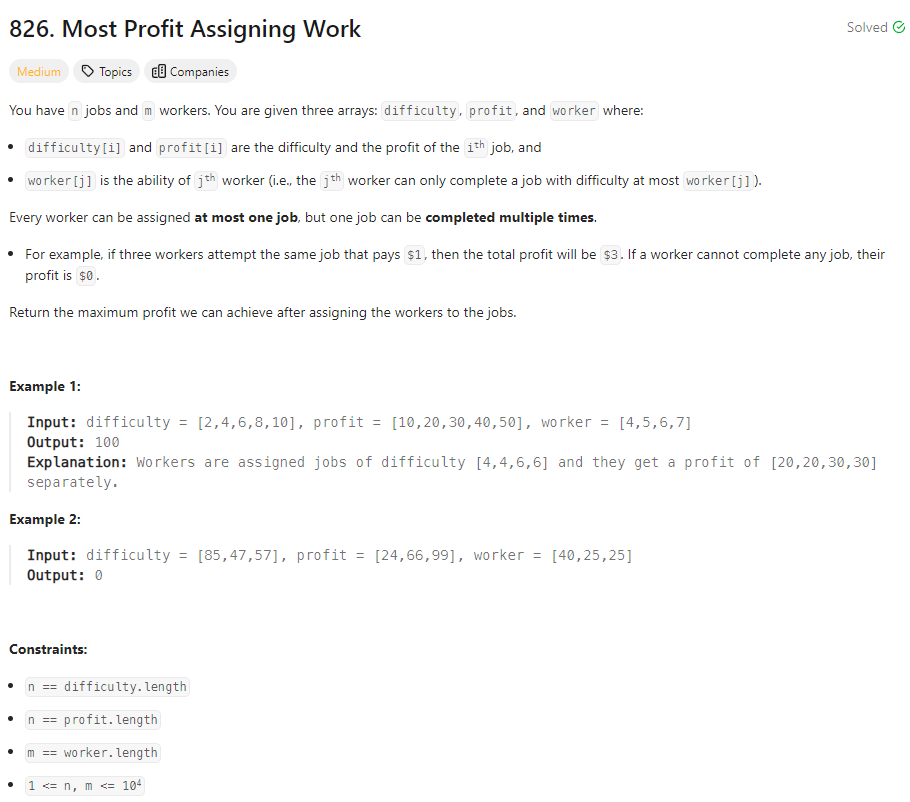Problem Statement

Max Heap - TLE
class Solution:
def maxProfitAssignment(self, difficulty: List[int], profit: List[int], worker: List[int]) -> int:
res = 0
for w in worker:
max_heap = []
for diff, prof in zip(difficulty, profit):
heappush(max_heap, [prof * -1, diff])
while max_heap:
p, d = heappop(max_heap)
p *= -1
if w >= d:
res += p
break
return res
Brute Force - Accepted
class Solution:
def maxProfitAssignment(self, difficulty: List[int], profit: List[int], worker: List[int]) -> int:
res = 0
arr = []
for d, p in zip(difficulty, profit):
arr.append([p, d])
arr.sort(reverse=True)
for w in worker:
for p, d in arr:
if w >= d:
res += p
break
return res
Editorial
Approach 1: Binary Search and Greedy (Sort by Job Difficulty)
class Solution:
def maxProfitAssignment(
self, difficulty: List[int], profit: List[int], worker: List[int]
) -> int:
job_profile = [(0, 0)]
for i in range(len(difficulty)):
job_profile.append((difficulty[i], profit[i]))
# Sort by difficulty values in increasing order.
job_profile.sort()
for i in range(len(job_profile) - 1):
job_profile[i + 1] = (
job_profile[i + 1][0],
max(job_profile[i][1], job_profile[i + 1][1]),
)
net_profit = 0
for i in range(len(worker)):
ability = worker[i]
# Find the job with just smaller or equal difficulty than ability.
l, r = 0, len(job_profile) - 1
job_profit = 0
while l <= r:
mid = (l + r) // 2
if job_profile[mid][0] <= ability:
job_profit = max(job_profit, job_profile[mid][1])
l = mid + 1
else:
r = mid - 1
# Increment profit of current worker to total profit.
net_profit += job_profit
return net_profit
Approach 2: Binary Search and Greedy (Sort by profit)
class Solution:
def maxProfitAssignment(
self, difficulty: List[int], profit: List[int], worker: List[int]
) -> int:
job_profile = [(0, 0)]
for i in range(len(difficulty)):
job_profile.append((profit[i], difficulty[i]))
# Sort in decreasing order of profit.
job_profile.sort(reverse=True)
for i in range(len(job_profile) - 1):
job_profile[i + 1] = (
job_profile[i + 1][0],
min(job_profile[i][1], job_profile[i + 1][1]),
)
net_profit = 0
for ability in worker:
# Maximize profit using binary search.
l, r = 0, len(job_profile) - 1
job_profit = 0
while l <= r:
mid = (l + r) // 2
if job_profile[mid][1] <= ability:
job_profit = max(job_profit, job_profile[mid][0])
r = mid - 1
else:
l = mid + 1
# Add profit of each worker to total profit.
net_profit += job_profit
return net_profit
Approach 3: Greedy and Two-Pointers
class Solution:
def maxProfitAssignment(
self, difficulty: List[int], profit: List[int], worker: List[int]
) -> int:
job_profile = [
(difficulty[i], profit[i]) for i in range(len(difficulty))
]
# Sort both worker and job_profile arrays
worker.sort()
job_profile.sort()
net_profit, max_profit, index = 0, 0, 0
for ability in worker:
# While the index has not reached the end and worker can pick a job
# with greater difficulty move ahead.
while index < len(difficulty) and ability >= job_profile[index][0]:
max_profit = max(max_profit, job_profile[index][1])
index += 1
net_profit += max_profit
return net_profit
